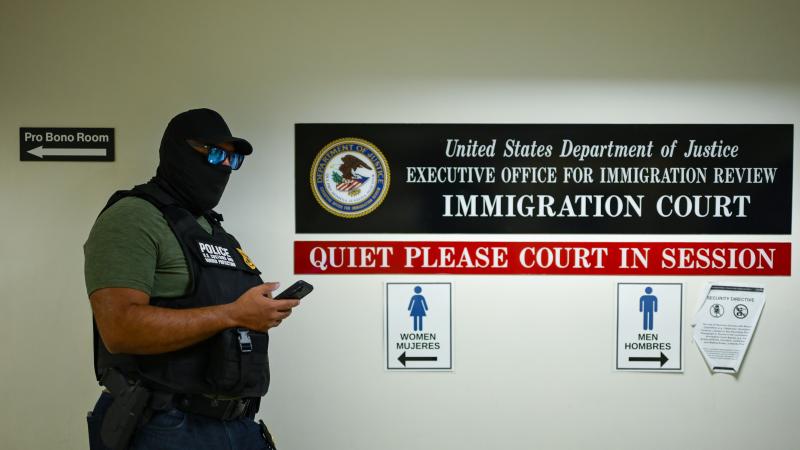Foreign policy double standards: Trump's string of wins perpetually downplayed by opposition
As Trump continues to rack up foreign policy wins, it’s never good enough for Democrats with a history of heaping unwarranted praise on Biden for catastrophes like the Afghanistan withdrawal.
As President Donald Trump has achieved historic peace deals across the globe, media treatment of his presidency is on track to resemble the pre-determined critical nature shown in Trump's first term. Near the 100th day of his second term, Media Research Center, a conservative-leaning media watchdog, found that 92% of mainstream media coverage of Trump has been consistently negative. The contrast to former President Joe Biden, who enjoyed 59% positive news coverage, shows a glaring double standard when it comes to recognizing White House success, particularly in the area of foreign policy.
A Google search yielded no footage of U.S. news networks covering the historic landing of an El-Al jet in the UAE in 2020, after the adoption of the "Abraham Accords." In fact, only the BBC and the CBC in Canada appear to have covered that event as breaking news. The UK-based BBC called it "a major step in normalizing relations after the announcement of a peace deal," and noted that the UAE became only the third Arab country in the Middle East to recognize Israel since its founding in 1948.
Russia and Ukraine: "A good chance of getting there"
On Friday, Trump and Russian President Vladimir Putin conducted a press conference at Joint Base Elmendorf-Richardson in Anchorage, Alaska, after discussions aimed at resolving the Russia-Ukraine conflict.
On a stage featuring a "PURSUING PEACE" banner, both leaders signified their intent to broker a ceasefire, though no concrete deal was revealed. Furthermore, Putin ended his remarks by affirming what Trump has alleged for many years, which is that the Russian-Ukraine conflict would not have transpired if Trump was in office in 2022 when the war broke out.
Trump characterized the talks as "extremely productive", saying the two men made "great progress." "We didn't get there, but we have a very good chance of getting there," Trump told the press.
Thailand and Cambodia: Using trade as a leverage towards peace
Last month, Trump facilitated a ceasefire between Cambodia and Thailand, which ended five days of brutal border clashes that killed at least 36 people and displaced over 168,000. The negotiations took place amid Trump's ongoing trade negotiations with various countries, and he reportedly used that economic pressure as an incentive.
Trump announced on Truth Social that he spoke directly with Cambodian Prime Minister Hun Manet and Thailand’s Acting Prime Minister Phumtham Wechayachai, securing their agreement to halt hostilities and pursue peace talks. The ceasefire, mediated in Malaysia, was regarded as a step toward resolving a decades-long border dispute, with Trump highlighting that it saved thousands of lives and allowed trade discussions to resume.
Armenia and Azerbaijan: Decades of ethnic cleansing stopped
Earlier this month, President Donald Trump facilitated a landmark peace deal between Armenia and Azerbaijan, resolving decades of conflict over the Nagorno-Karabakh region, which, while internationally recognized as part of Azerbaijan, has been historically contested due to its majority ethnic Armenian population. Through a White House agreement signed by leaders Nikol Pashinyan and Ilham Aliyev, the accord introduced the Trump Peace Corridor, a trade route linking Azerbaijan to Nakhchivan via Armenia, with U.S. oversight to ensure that regional commerce and energy flow freely.
Both Nikol Pashinyan, the Prime Minister of Armenia, and Ilham Aliyev, the President of Azerbaijan, lauded Trump’s diplomacy, nominating him for a Nobel Peace Prize. They join a growing list of nations that have nominated the 45th and 47th president for the prize, which already includes Pakistan, Israel and Cambodia.
Pakistan and India: Tensions and violence since 1947
In May 2025, President Donald Trump negotiated a ceasefire between India and Pakistan, defusing a volatile Kashmir conflict that threatened to spiral into a broader nuclear crisis between the two nations. Typical of Trump's direct communication style during negotiations, Trump spoke to both nations’ leaders and leveraged economic incentives. As a result, Trump secured a truce in mere days, which is historic in the context of ongoing tensions between India and Pakistan since their 1947 partition.
Expansion of Abraham Accords in the offing
In recent months, foreign policy experts have proffered that Saudi Arabia, Syria, and Lebanon might soon join the Abraham Accords, a series of agreements initiated in 2020 to normalize diplomatic and economic ties between Israel and Arab nations. Established during his first term, Trump has indicated a desire to expand the pact.
Sources suggest Syria’s new leadership is quietly engaging in discussions with Israel, while Lebanon’s potential involvement hinges on resolving ongoing conflicts and making progress toward establishing a Palestinian state, a long-standing goal for a sovereign nation encompassing territories like the West Bank and Gaza.
Saudi Arabia’s participation could significantly alter Middle Eastern geopolitics, but it remains contingent on advancements in addressing the Palestinian issue, particularly the creation of a viable state and resolution of disputes over borders, refugees, and Jerusalem’s status.
Biden's Afghanistan disaster
Saturday marks the fourth anniversary of the Taliban's takeover of Kabul, Afghanistan. The Biden administration’s chaotic 2021 withdrawal, which precipitated the Taliban’s rapid takeover and the loss of 13 American service members, and hundreds of civilian lives, was a major foreign policy failure. Outside the United States, television news broadcasts featured clips of civilians clinging to aircraft in desperate attempts to escape. The refugees fell to their deaths, and NDTV called the withdrawal "total chaos."
Despite this, Democrats downplayed the disaster. U.S. media outlets and talking heads focused instead on the end of a 20-year war while ignoring the botched execution that abandoned allies and gave the Taliban billions of dollars worth of military equipment, much of it deadly. Aligned media framed it as a messy but necessary conclusion, and congressional Democrats avoided thorough investigations.
The fallout of Biden's blunder is still being felt today as Trump continues to clean up the mess left by his predecessor. Just last month, Trump stepped in to prevent the United Arab Emirates from returning U.S. allies captured by the victorious Taliban to Afghanistan. Incredulously, many in the media still count the withdrawal among Biden's so-called achievements.
Obama's "aspirational" Nobel Prize given as a boost for Obama
In 2009, the Nobel Committee awarded former President Barack Obama the Peace Prize mere months into his term, citing his aspirational diplomatic efforts, despite no major peace achievements. Toward the end of Obama's term in office, former Nobel committee secretary Geir Lundestad told the Associated Press that the committee hoped the award would strengthen Obama but that "the committee didn’t achieve what it had hoped for."
The decision drew widespread criticism for being premature, with analysts noting it was based more on Obama’s global popularity and campaign promises than tangible outcomes. Observers later pointed to his administration’s expanded drone program and military actions as undermining the award’s prestige.
The Council on Foreign Relations (CFR) reported in 2017 that President Obama authorized at least 542 drone strikes, killing an estimated 3,797 people. The CFR said that he reportedly told senior aides in 2011: “Turns out I’m really good at killing people. Didn’t know that was gonna be a strong suit of mine.”
The Facts Inside Our Reporter's Notebook
Links
- found that 92%
- the BBC, and the CBC
- ceasefire
- at least 36 people
- Trump announced
- facilitated
- Nagorno-Karabakh region
- Trump Peace Corridor
- nominating him
- ceasefire
- 1947 partition
- foreign policy experts
- Established
- expand the pact
- quietly engaging
- Lebanonâs potential
- takeover of Kabul
- loss of 13 American
- The refugees fell to their deaths
- messy but necessary
- avoided thorough investigations
- stepped in
- still count
- awarded former President
- Associated Press
- criticism
- premature
- undermining
- Obama authorized at least 542 drone strikes













